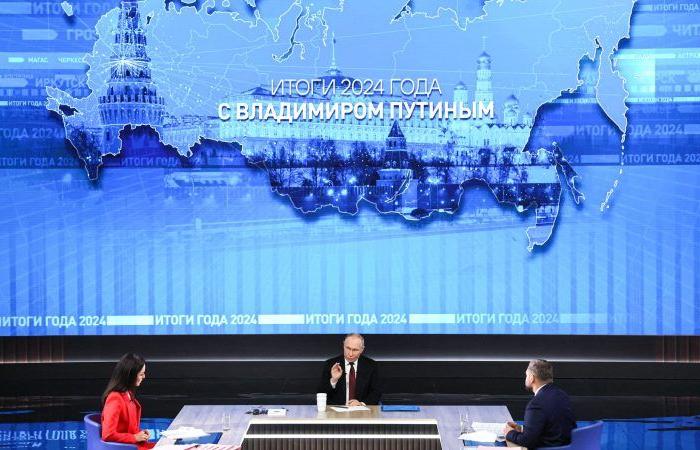In his “marathon” press conference at the end of the year, Russian President Vladimir Putin claimed the successes achieved in Ukraine, but refused to answer questions about the situation in the Kursk region where an offensive by Ukrainian forces has been underway since August . Putin’s press conference comes a few weeks after the fall of the Syrian regime of Bashar al Assad, a great ally of Moscow, and a few days after the killing of General Igor Kirillov seven kilometers from the Kremlin, defined by the Russian leader himself as the result of “serious mistakes ” of the Russian special services.
Putin’s annual appointment with the media lasted over 4 hours and took place while the European Council is underway in Brussels in which Ukrainian President Volodymyr Zelensky also participates, the Russian leader stated that the situation in the conflict in Ukraine is changing “drastically” and Russia is getting closer to achieving its “priority goals”.
Zelensky reiterates the need for a united front between the US and the EU
The President of Ukraine, Volodymyr Zelensky, reiterated the need for a united front between the United States and the European Union to provide decisive support to the country and achieve a just peace.
Speaking to journalists in Brussels on Thursday alongside the…
Putin also stressed that he is ready to meet US President-elect Donald Trump, while noting that he has not had contact with him for over four years.
“We are ready for negotiations, but we need Ukrainians to be ready for negotiations and compromises” to put an end to the conflict, Putin added, underlining that “politics is the art of compromise and negotiations are a compromise” and at the same time noting that the authorities in Kyiv are not legitimate.
“We have no preconditions for starting negotiations, but peace documents will be signed only with a legitimate leader,” he said, referring to Ukrainian President Volodymyr Zelensky. However, he stressed that Kyiv must also demonstrate a real willingness to compromise, highlighting how, in 2022, “former British Prime Minister Boris Johnson persuaded Kyiv to continue fighting,” thus prolonging the conflict.
“If there are elections, if someone becomes legitimate, we will talk to everyone, including Zelensky. If Ukraine really wants to take the path towards a peaceful solution, it can certainly do so. But we can only sign (peace agreements) with those who are legitimate. And the Rada (Ukrainian Parliament) and the chairman of the Rada are legitimate,” Putin said.
The Russian leader has issued a challenge to the United States regarding the technological clash, inviting it to intercept the new Russian hypersonic ballistic missile Oreshnik. “They can designate a target in Kyiv, and see if they can shoot it down, we would really like to do this experiment,” Putin said, adding that the missile now has a range of 5,500 kilometers.
Putin explained that the anti-missile systems installed in Romania and Poland “would not be able to counter them even at a distance of two thousand kilometers”, underlining Russian technological superiority in this area. “Almost all NATO countries are at war against Russia,” Putin added, lamenting the rising costs of war materials for the Alliance and questioning the economic sustainability of growing military spending.
During his marathon end-of-year news conference, Putin also refused to say when Russian forces will retake the southern Kursk region from Ukraine, insisting they were advancing “along the entire front line.”
The situation on the ground, however, remains complex: the Russian army continues to conduct large-scale military operations, but is using thousands of troops made available by North Korea to counter the Ukrainian offensive in Kursk which, according to intelligence Ukraine, would be suffering huge losses.
Ukraine, supported by NATO countries, resists, but as underlined in a recent interview by Ukrainian President Zelensky, Kyiv does not have sufficient forces to retake Donbass and Crimea.
Putin claims close relations with Belarus and China
On the strategic alliance front, Putin reiterated the importance of ties with Belarus, a key ally in the region. “Any threat to Belarus will be regarded as a threat to Russia itself,” he said, underlining close cooperation with Belarusian President Alexander Lukashenko. This partnership, according to Putin, is an integral part of the updated Russian nuclear strategy, a clear signal to Western adversaries of the solidity of the Moscow-Minsk axis.
The situation in Syria was also the subject of reflection. The Russian intervention, according to Putin, was successful in preventing the creation of a terrorist enclave similar to those in other countries, such as Afghanistan. “This is not a defeat for Russia, we have achieved our goals,” he said, rejecting Western criticism. However, he acknowledged that the situation in the Middle Eastern country remains complex, expressing hope that Syria can achieve peace and stability. Putin also clarified that the Russian military presence is limited to two bases – one air force and one naval – and operates mainly in support of local forces and some pro-Iranian formations. In this regard, he confirmed the transfer of 4,000 Iranian fighters from Syria to Tehran, at the request of the Iranian authorities.
In the long press conference, Putin also underlined that relations with China represent a pillar of Russian foreign policy. Putin praised the level of cooperation between the two countries, describing their alliance as based on “complete mutual trust”. He highlighted the volume of trade, which has reached between 220 and 240 billion dollars, underlining the importance of a strong economic partnership to address global challenges. “We act in accordance with our national interests,” he said, calling Chinese President Xi Jinping a personal friend.
[a cura di Simone Cantarini]
Related News :
